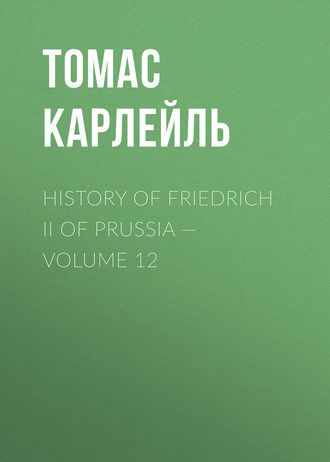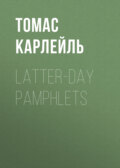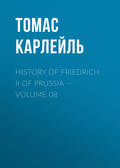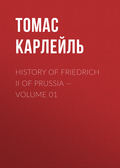
Томас Карлейль
History of Friedrich II of Prussia — Volume 12
Chapter XI. — THE BURSTING FORTH OF BEDLAMS: BELLEISLE AND THE BREAKERS OF PRAGMATIC SANCTION
The Battle of Mollwitz went off like a signal-shot among the Nations; intimating that they were, one and all, to go battling. Which they did, with a witness; making a terrible thing of it, over all the world, for above seven years to come. Foolish Nations; doomed to settle their jarring accounts in that terrible manner! Nay, the fewest of them had any accounts, except imaginary ones, to settle there at all; and they went into the adventure GRATIS, spurred on by spectralities of the sick brain, by phantasms of hope, phantasms of terror; and had, strictly speaking, no actual business in it whatever.
Not that Mollwitz kindled Europe; Europe was already kindled for some two years past;—especially since the late Kaiser died, and his Pragmatic Sanction was superadded to the other troubles afoot. But ever since that Image of JENKINS'S EAR had at last blazed up in the slow English brain, like a fiery constellation or Sign in the Heavens, symbolic of such injustices and unendurabilities, and had lighted the Spanish-English War, Europe was slowly but pretty surely taking fire. France "could not see Spain humbled," she said: England (in its own dim feeling, and also in the fact of things) could not do at all without considerably humbling Spain. France, endlessly interested in that Spanish-English matter, was already sending out fleets, firing shots,—almost, or altogether, putting forth her hand in it. "In which case, will not, must not, Austria help us?" thought England,—and was asking, daily, at Vienna (with intense earnestness, but without the least result), through Excellency Robinson there, when the late Kaiser died. Died, poor gentleman;—and left his big Austrian Heritages lying, as it were, in the open market-place; elaborately tied by diplomatic packthread and Pragmatic Sanction; but not otherwise protected against the assembled cupidities of mankind! Independently of Mollwitz, or of Silesia altogether, it was next to impossible that Europe could long avoid blazing out; especially unless the Spanish-English quarrel got quenched, of which there was no likelihood.
But if not as cause, then as signal, or as signal and cause together (which it properly was), the Battle of Mollwitz gave the finishing stroke, and set all in motion. This was "the little stone broken loose from the mountain;" this, rather than the late Kaiser's Death, which Friedrich defined in that manner. Or at least, this was the first LEAP it took; hitting other stones big and little, which again hit others with their leaping and rolling,—till the whole mountain-side is in motion under law of gravity, and you behold one wide stone-torrent thundering towards the valleys; shivering woods, farms, habitations clean away with it: fatal to any Image of composite Clay and Brass which it may meet!
There is, accordingly, from this point, a change in Friedrich's Silesian Adventure; which becomes infinitely more complicated for him,—and for those that write of him, no less! Friedrich's business henceforth is not to be done by direct fighting, but rather by waiting to see how, and on what side, others will fight: nor can we describe or understand Friedrich's business, except as in connection with the immense, obsolete, and indeed delirious Phenomenon called Austrian-Succession War, upon which it is difficult to say any human word. If History, driven upon Dismal Swamp with its horrors and perils, can get across unsunk, she will be lucky!
For, directly on the back of Mollwitz, there ensued, first, an explosion of Diplomatic activity such as was never seen before; Excellencies from the four winds taking wing towards Friedrich; and talking and insinuating, and fencing and fugling, after their sort, in that Silesian Camp of his, the centre being there. A universal rookery of Diplomatists;—whose loud cackle and cawing is now as if gone mad to us; their work wholly fallen putrescent and avoidable, dead to all creatures. And secondly, in the train of that, there ensued a universal European War, the French and the English being chief parties in it; which abounds in battles and feats of arms, spirited but delirious, and cannot be got stilled for seven or eight years to come; and in which Friedrich and his War swim only as an intermittent Episode henceforth. What to do with such a War; how extricate the Episode, and leave the War lying? The War was at first a good deal mad; and is now, to men's imagination, fallen wholly so; who indeed have managed mostly to forget it; only the Episode (reduced thereby to an UNintelligible state) retaining still some claims on them.
It is singular into what oblivion the huge Phenomenon called Austrian-Succession War has fallen; which, within a hundred years ago or little more, filled all mortal hearts! The English were principals on one side; did themselves fight in it, with their customary fire, and their customary guidance ("courageous Wooden Pole with Cocked Hat," as our friend called it); and paid all the expenses, which were extremely considerable, and are felt in men's pockets to this day: but the English have more completely forgotten it than any other People. "Battle of Dettingen, Battle of Fontenay,—what, in the Devil's name, were we ever doing there?" the impatient Englishman asks; and can give no answer, except the general one: "Fit of insanity; DELIRIUM TREMENS, perhaps FURENS;—don't think of it!" Of Philippi and Arbela educated Englishmen can render account; and I am told young gentlemen entering the Army are pointedly required to say who commanded at Aigos-Potamos and wrecked the Peloponnesian War: but of Dettingen and Fontenoy, where is the living Englishman that has the least notion, or seeks for any? The Austrian-Succession War did veritably rage for eight years, at a terrific rate, deforming the face of Earth and Heaven; the English paying the piper always, and founding their National Debt thereby:—but not even that could prove mnemonic to them; and they have dropped the Austrian-Succession War, with one accord, into the general dustbin, and are content it should lie there. They have not, in their language, the least approach to an intelligible account of it: How it went on, whitherward, whence; why it was there at all,—are points dark to the English, and on which they do not wish to be informed. They have quitted the matter, as an unintelligible huge English-and-Foreign Delirium (which in good part it was); Delirium unintelligible to them; tedious, not to say in parts, as those of the Austrian Subsidies, hideous and disgusting to them; happily now fallen extinct; and capable of being skipped, in one's inquiries into the wonders of this England and this World. Which, in fact, is a practical conclusion not so unwise as it looks.
"Wars are not memorable," says Sauerteig, "however big they may have been, whatever rages and miseries they may have occasioned, or however many hundreds of thousands they may have been the death of,—except when they have something of World-History in them withal. If they are found to have been the travail-throes of great or considerable changes, which continue permanent in the world, men of some curiosity cannot but inquire into them, keep memory of them. But if they were travail-throes that had no birth, who of mortals would remember them? Unless perhaps the feats of prowess, virtue, valor and endurance, they might accidentally give rise to, were very great indeed. Much greater than the most were, which came out in that Austrian-Succession case! Wars otherwise are mere futile transitory dust-whirlwinds stilled in blood; extensive fits of human insanity, such as we know are too apt to break out;—such as it rather beseems a faithful Son of the House of Adam NOT to speak about again; as in houses where the grandfather was hanged, the topic of ropes is fitly avoided.
"Never again will that War, with its deliriums, mad outlays of blood, treasure, and of hope and terror, and far-spread human destruction, rise into visual life in any imagination of living man. In vain shall Dryasdust strive: things mad, chaotic and without ascertainable purpose or result, cannot be fixed into human memories. Fix them there by never so many Documentary Histories, elaborate long-eared Pedantries, and cunning threads, the poor human memory has an alchemy against such ill usage;—it forgets them again; grows to know them as a mere torpor, a stupidity and horror, and instinctively flies from Dryasdust and them."
Alive to any considerable degree, in the poor human imagination, this Editor does not expect or even wish the Austrian-Succession War to be. Enough for him if it could be understood sufficiently to render his poor History of Friedrich intelligible. For it enwraps Friedrich like a world-vortex henceforth; modifies every step of his existence henceforth; and apart from it, there is no understanding of his business or him. "So much as sticks to Friedrich:" that was our original bargain! Assist loyally, O reader, and we will try to make the indispensable a minimum for you.
WHO WAS TO BLAME FOR THE AUSTRIAN-SUCCESSION WAR?
The first point to be noted is, Where did it originate? To which the answer mainly is, With that lean Gentleman whom we saw with Papers in the OEil-de-Boeuf on New-year's day last. With Monseigneur the Marechal de Belleisle principally; with the ambitious cupidities and baseless vanities of the French Court and Nation, as represented by Belleisle. George II.'s Spanish War, if you will examine, had a real necessity in it. Jenkins's Ear was the ridiculous outside figure this matter had: Jenkins's Ear was one final item of it; but the poor English People, in their wrath and bellowings about that small item, were intrinsically meaning: "Settle the account; let us have that account cleared up and liquidated; it has lain too long!" And seldom were a People more in the right, as readers shall yet see.
The English-Spanish War had a basis to stand on in this Universe. The like had the Prussian-Austrian one; so all men now admit. If Friedrich had not business there, what man ever had in an enterprise he ventured on? Friedrich, after such trial and proof as has seldom been, got his claims on Schlesien allowed by the Destinies. His claims on Schlesien;—and on infinitely higher things; which were found to be his and his Nation's, though he had not been consciously thinking of them in making that adventure. For, as my poor Friend insists, there ARE Laws valid in Earth and in Heaven; and the great soul of the world is just. Friedrich had business in this War; and Maria Theresa VERSUS Friedrich had likewise cause to appear in court, and do her utmost pleading against him.
But if we ask, What Belleisle or France and Louis XV. had to do there? the answer is rigorously, Nothing. Their own windy vanities, ambitions, sanctioned not by fact and the Almighty Powers, but by phantasm and the babble of Versailles; transcendent self-conceit, intrinsically insane; pretensions over their fellow-creatures which were without basis anywhere in Nature, except in the French brain alone: it was this that brought Belleisle and France into a German War. And Belleisle and France having gone into an Anti-Pragmatic War, the unlucky George and his England were dragged into a Pragmatic one,—quitting their own business, on the Spanish Main, and hurrying to Germany,—in terror as at Doomsday, and zeal to save the Keystone of Nature these. That is the notable point in regard to this War: That France is to be called the author of it, who, alone of all the parties, had no business there whatever. And the wages due to France for such a piece of industry,—the reader will yet see what wages France and the other parties got, at the tail of the affair. For that too is apparent in our day.
We have often said, the Spanish-English War was itself likely to have kindled Europe; and again Friedrich's Silesian War was itself likely,—France being nearly sure to interfere. But if both these Wars were necessary ones, and if France interfered in either of them on the wrong side, the blame will be to France, not to the necessary Wars. France could, in no way, have interfered in a more barefacedly unjust and gratuitous manner than she now did; nor, on any terms, have so palpably made herself the author of the conflagration of deliriums that ensued for above Seven years henceforth. Nay for above Twenty years,—the settlement of this Silesian Pragmatic-Antipragmatic matter (and of Jenkins's Ear, incidentally, ALONG with this!) not having fairly completed itself till 1763.
HOW BELLEISLE MADE VISIT TO TEUTSCHLAND; AND THERE WAS NO FIT HENRY THE FOWLER TO WELCOME HIM
It is very wrong to keep Enchanted Wiggeries sitting in this world, as if they were things still alive! By a species of "conservatism," which gets praised in our Time, but which is only a slothful cowardice, base indifference to truth, and hatred to trouble in comparison with lies that sit quiet, men now extensively practise this method of procedure;—little dreaming how bad and fatal it at all times is. When the brains are out, things really ought to die;—no matter what lovely things they were, and still affect to be, the brains being out, they actually ought in all cases to die, and with their best speed get buried. Men had noses, at one time; and smelt the horror of a deceased reality fallen putrid, of a once dear verity become mendacious, phantasmal; but they have, to an immense degree, lost that organ since, and are now living comfortably cheek-by-jowl with lies. Lies of that sad "conservative" kind,—and indeed of all kinds whatsoever: for that kind is a general mother; and BREEDS, with a fecundity that is appalling, did you heed it much!—
It was pity that the "Holy Romish Reich, Teutsch by Nation," had not got itself buried some ages before. Once it had brains and life, but now they were out. Under the sway of Barbarossa, under our old anti-chaotic friend Henry the Fowler, how different had it been! No field for a Belleisle to come and sow tares in; no rotten thatch for a French Sun-god to go sailing about in the middle of, and set fire to! Henry, when the Hungarian Pan-Slavonic Savagery came upon him, had got ready in the interim; and a mangy dog was the "tribute" he gave them; followed by the due extent of broken crowns, since they would not be content with that. That was the due of Belleisle too,—had there been a Henry to meet him with it, on his crossing the marches, in Trier Country, in Spring, 1741: "There, you anarchic Upholstery-Belus, fancying yourself God of the Sun; there is what Teutschland owes you. Go home with that; and mind your own business, which I am told is plentiful, if you had eye for it!"
But the sad truth is, for above Four Centuries now,—and especially for Three, since little Kaiser Karl IV. "gave away all the moneys of it," in his pressing occasions, this Holy Romish Reich, Teutsch by Nation, has been more and ever more becoming an imaginary quantity; the Kaisership of it not capable of being worn by anybody, except a Hapsburger who had resources otherwise his own. The fact is palpable. And Austria, and Anti-Reformation Entity, "conservative" in that bad sense, of slothfully abhorring trouble in comparison with lies, had not found the poison more mal-odorous in this particular than in many others. And had cherished its "Holy Romish Reich" grown UNholy, phantasmal, like so much else in Austrian things; and had held firm grip of it, these Three Hundred years; and found it a furthersome and suitable thing, though sensible it was more and more becoming an Enchanted Wiggery pure and simple. Nor have the consequences failed; they never do. Belleisle, Louis XIV., Henri II., Francois I.: it is long since the French have known this state of matters; and been in the habit of breaking in upon it, fomenting internal discontents, getting up unjust Wars,—with or without advantage to France, but with endless disadvantage to Germany. Schmalkaldic War; Thirty-Years War; Louis XIV.'s Wars, which brought Alsace and the other fine cuttings; late Polish-Election War, and its Lorraine; Austrian-Succession War: many are the wars kindled on poor Teutschland by neighbor France; and large is the sum of woes to Europe and to it, chargeable to that score. Which appears even yet not to be completed?—Perhaps not, even yet. For it is the penalty of being loyal to Enchanted Wiggeries; of living cheek-by-jowl with lies of a peaceable quality, and stuffing your nostrils, and searing your soul, against the accursed odor they all have!—For I can assure you the curse of Heaven does dwell in one and all of them; and the son of Adam cannot too soon get quit of their bad partnership, cost him what it may.
Belleisle's Journey as Sun-god began in March,—"end of March, 1741," no date of a day to be had for that memorable thing:—and he went gyrating about, through the German Courts, for almost a year afterwards; his course rather erratic, but always in a splendor as of Belus, with those hundred and thirty French Lords and Valets, and the glory of Most Christian King irradiating him. Very diligent for the first six months, till September or October next, which we may call his SEED-TIME; and by no means resting after nine or twelve months, while the harrowing and hoeing went on. In January, 1742, he had the great satisfaction to see a Bavarian Kaiser got, instead of an Austrian; and everywhere the fruit of his diligent husbandry begin to BEARD fairly above ground, into a crop of facts (like armed men from dragon's teeth), and "the pleasure of the"—WHOM was it the pleasure of?—"prosper in his hands." Belleisle was a pretty man; but I doubt it was not "the Lord" he was doing the pleasure of, on this occasion, but a very Different Personage, disguised to resemble him in poor Belleisle's eyes!—
Austria was not dangerous to France in late times, and now least of all; how far from it,—humbled by the loss of Lorraine; and now as it were bankrupt, itself in danger from all the world. And France, so far as express Treaties could bind a Nation, was bound to maintain Austria in its present possessions. The bitter loss of Lorraine had been sweetened to the late Kaiser by that solitary drop of consolation;—as his Failure of a Life had been, poor man: "Failure the most of me has been; but I have got Pragmatic Sanction, thanks to Heaven, and even France has signed it!" Loss of Lorraine, loss of Elsass, loss of the Three Bishoprics; since Karl V.'s times, not to speak of earlier, there has been mere loss on loss:—and now is the time to consummate it, think Belleisle and France, in spite of Treaties.
Towards humbling or extinguishing Austria, Belleisle has two preliminary things to do: FIRST, Break the Pragmatic Sanction, and get everybody to break it; SECOND, Guide the KAISERWAHL (Election of a Kaiser), so that it issue, not in Grand-Duke Franz, Maria Theresa's Husband, as all expect it will, but in another party friendly to France:—say in Karl Albert of Bavaria, whose Family have long been good clients of ours, dependent on us for a living in the Political World. Belleisle, there is little doubt, had from the first cast his eye on this unlucky Karl Albert for Kaiser; but is uncertain as to carrying him. Belleisle will take another if he must; Kur-Sachsen, for example;—any other, and all others, only not the Grand-Duke: that is a point already fixed with Belleisle, though he keeps it well in the background, and is careful not to hint it till the time come.
In regard to Pragmatic Sanction, Belleisle and France found no difficulty,—or the difficulty only (which we hope must have been considerable) of eating their own Covenant in behalf of Pragmatic Sanction; and declaring, which they did without visible blush, That it was a Covenant including, if not expressly, then tacitly, as all human covenants do, this clause, "SALVO JURE TERTII (Saving the rights of Third Parties),"—that is, of Electors of Bavaria, and others who may object, against it! O soul of honor, O first Nation of the Universe, was there ever such a subterfuge? Here is a field of flowering corn, the biggest in the world, begirt with elaborate ring-fence, many miles of firm oak-paling pitched and buttressed;—the poor gentleman now dead gave you his Lorraine, and almost his life, for swearing to keep up said paling. And you do keep it up,—all except six yards; through which the biggest team on the highway can drive freely, and the paltriest cadger's ass can step in for a bellyful!
It appears, the first Nation of the Universe had, at an early period of their consultations, hit upon this of SALVO JURE TERTII, as the method of eating their Covenant, before an enlightened public. [20th January, 1741, in their Note of Ceremony, recognizing Maria Theresa as Queen of Hungary, Note which had been due so very long (ADELUNG, ii. 206), there is ominous silence on Pragmatic Sanction; "beginning of March," there is virtual avowal of SALVO JURE (ib. 279);—open avowal on Belleisle's advent (ib. 305).] And they persisted in it, there being no other for them. An enlightened public grinned sardonically, and was not taken in; but, as so many others were eating their Covenants, under equally poor subterfuges, the enlightened public could not grin long on any individual,—could only gape mutely, with astonishment, on all. A glorious example of veracity and human nobleness, set by the gods of this lower world to their gazing populations, who could read in the Gazettes! What is truth, falsity, human Kingship, human Swindlership? Are the Ten Commandments only a figure of speech, then? And it was some beggarly Attorney-Devil that built this sublunary world and us? Questions might rise; had long been rising;—but now there was about enough, and the response to them was falling due; and Belleisle himself, what is very notable, had been appointed to get ready the response. Belleisle (little as Belleisle dreamt of it, in these high Enterprises) was ushering in, by way of response, a RAGNAROK, or Twilight of the Gods, which, as "French Revolution, or Apotheosis of SANSCULOTTISM," is now well known;—and that is something to consider of!






